Unit 10 You're supposed to shake hands Section B课件(共37张PPT)人教版九年级全一册
文档属性
| 名称 | Unit 10 You're supposed to shake hands Section B课件(共37张PPT)人教版九年级全一册 | 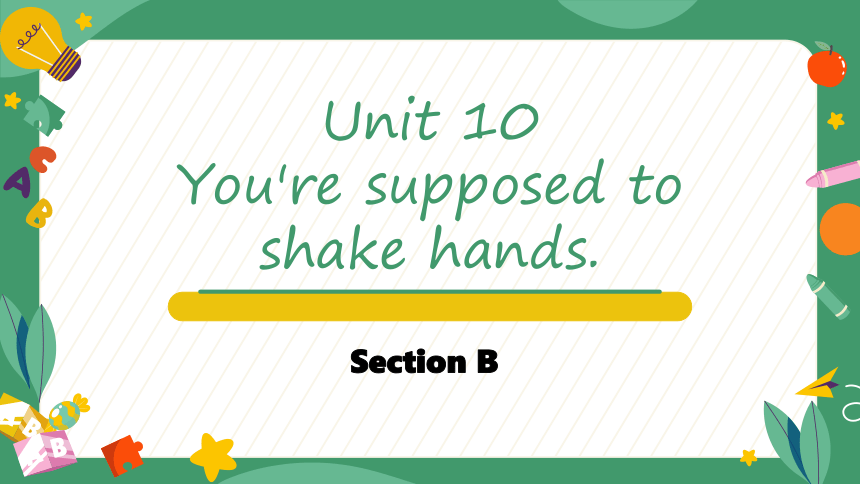 | |
| 格式 | pptx | ||
| 文件大小 | 2.7MB | ||
| 资源类型 | 教案 | ||
| 版本资源 | 人教新目标(Go for it)版 | ||
| 科目 | 英语 | ||
| 更新时间 | 2024-09-03 21:41:20 | ||
图片预览

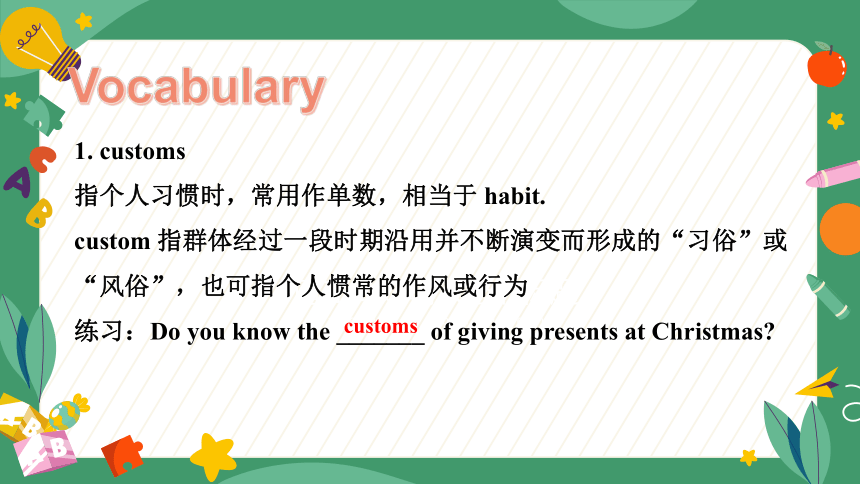
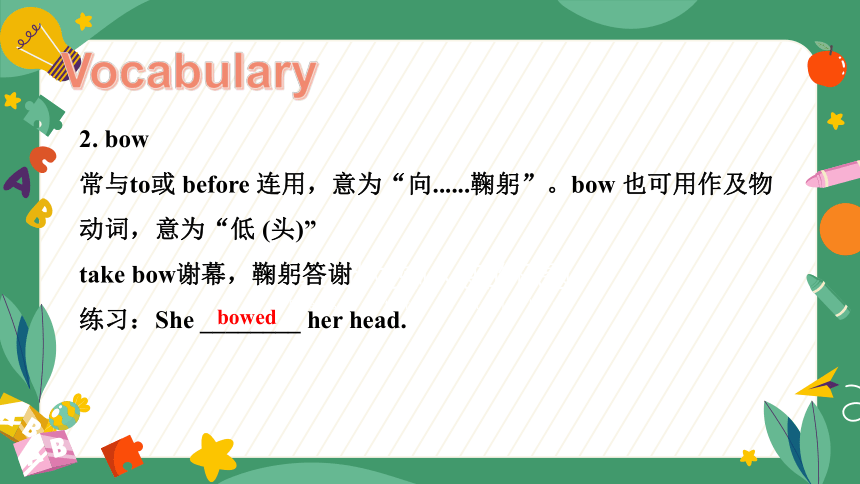
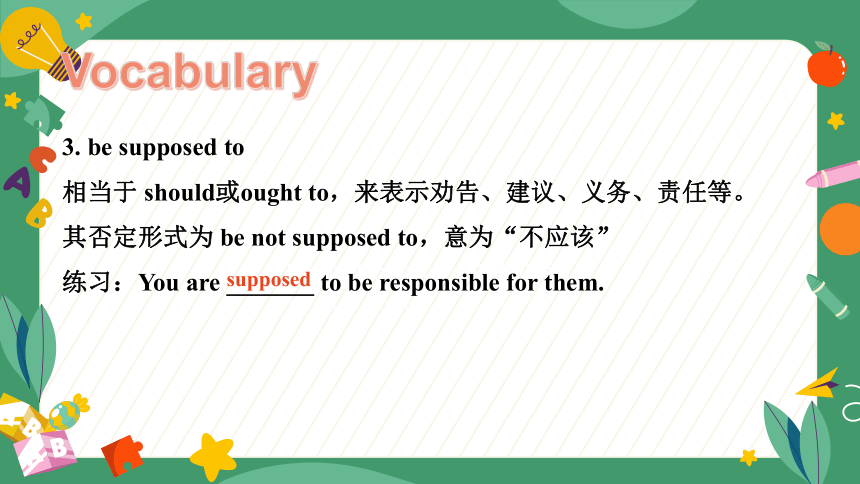
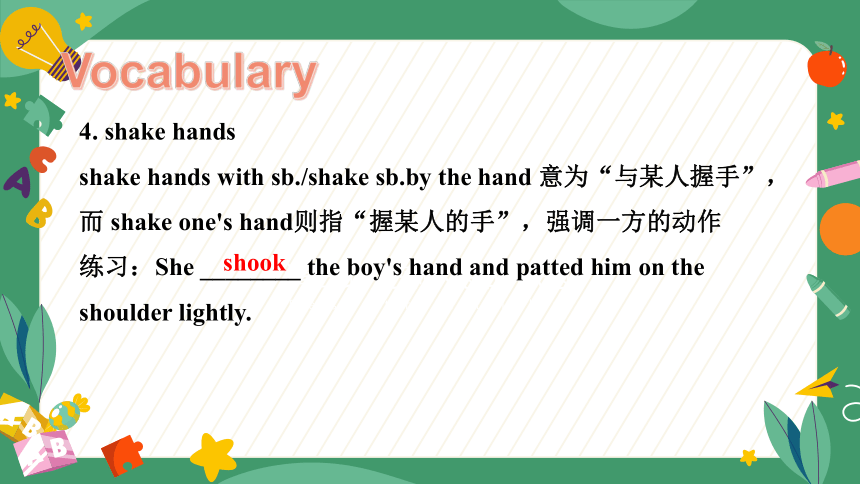

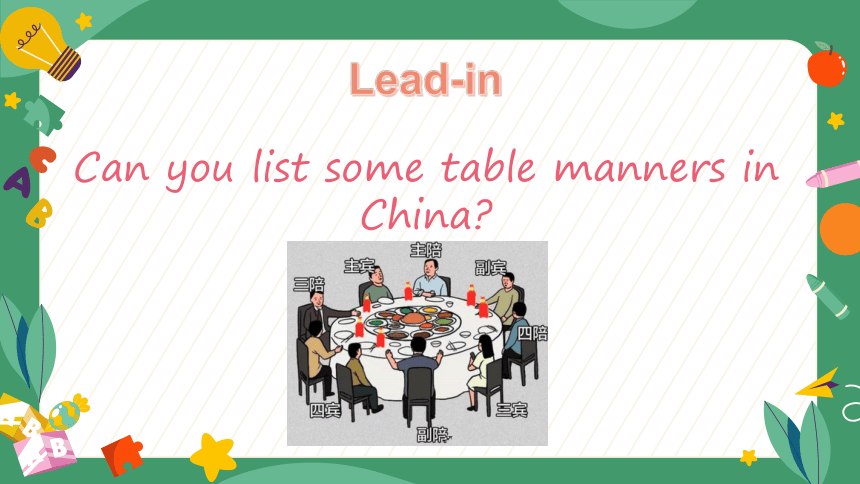
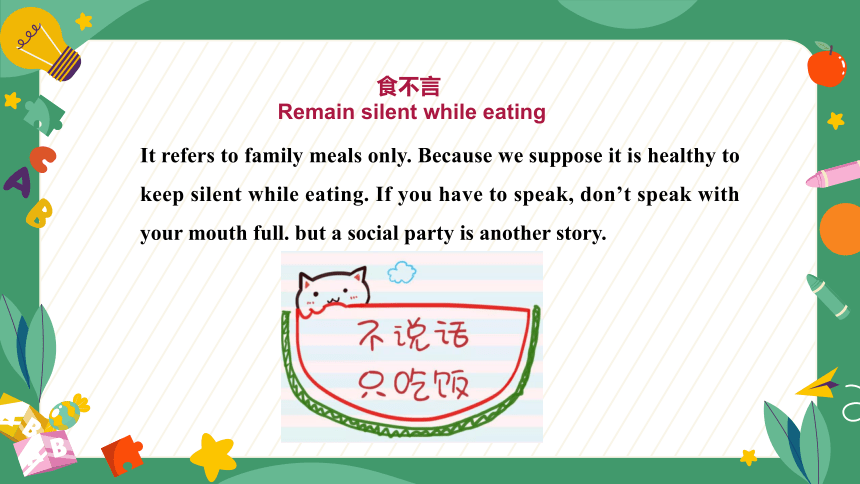
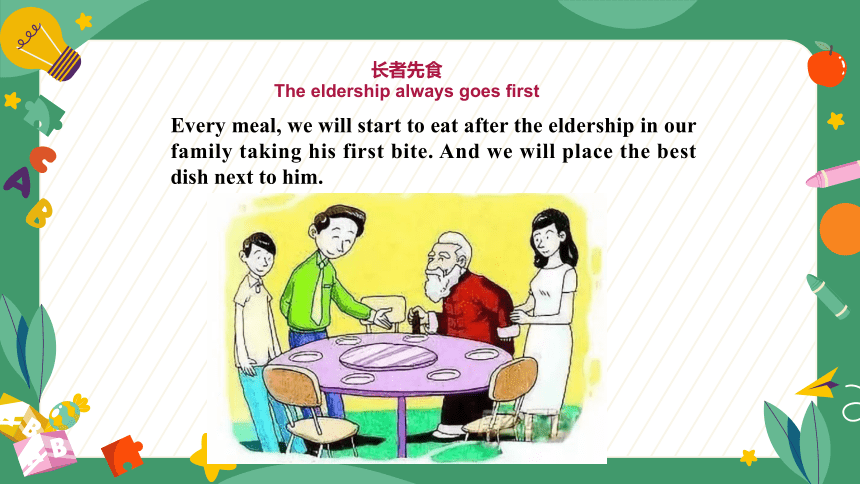
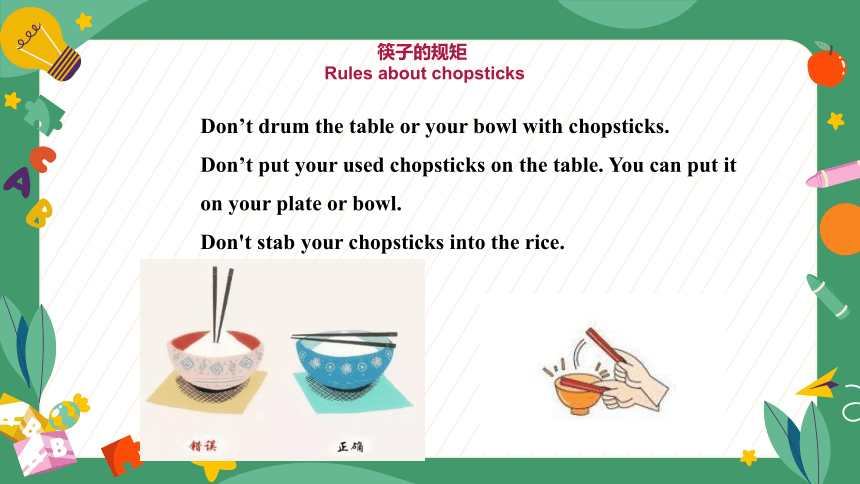
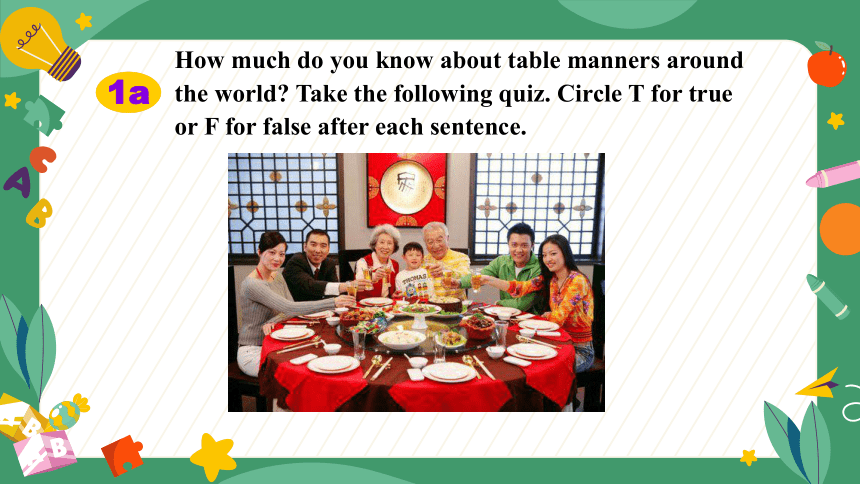
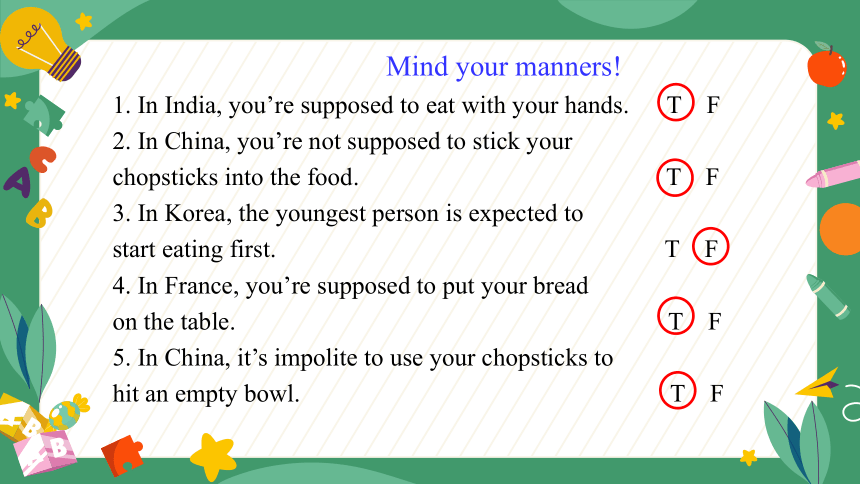
文档简介
(共37张PPT)
Section B
Unit 10
You're supposed to
shake hands.
请在此处输入您的标题
Please enter your title here
Vocabulary
1. customs
指个人习惯时,常用作单数,相当于 habit.
custom 指群体经过一段时期沿用并不断演变而形成的“习俗”或“风俗”,也可指个人惯常的作风或行为
练习:Do you know the _______ of giving presents at Christmas
customs
请在此处输入您的标题
Please enter your title here
Vocabulary
2. bow
常与to或 before 连用,意为“向......鞠躬”。bow 也可用作及物动词,意为“低 (头)”
take bow谢幕,鞠躬答谢
练习:She ________ her head.
bowed
请在此处输入您的标题
Please enter your title here
Vocabulary
3. be supposed to
相当于 should或ought to,来表示劝告、建议、义务、责任等。其否定形式为 be not supposed to,意为“不应该”
练习:You are _______ to be responsible for them.
supposed
请在此处输入您的标题
Please enter your title here
Vocabulary
4. shake hands
shake hands with sb./shake sb.by the hand 意为“与某人握手”,而 shake one's hand则指“握某人的手”,强调一方的动作
练习:She ________ the boy's hand and patted him on the shoulder lightly.
shook
请在此处输入您的标题
Please enter your title here
Vocabulary
5. expect
expect to do sth 意为“期待做某事”;expect sb.to do sth意为“期待某人做某事”
练习:I ________ to see him at once.
expect
Lead-in
Can you list some table manners in China
食不言
Remain silent while eating
It refers to family meals only. Because we suppose it is healthy to keep silent while eating. If you have to speak, don’t speak with your mouth full. but a social party is another story.
长者先食
The eldership always goes first
Every meal, we will start to eat after the eldership in our family taking his first bite. And we will place the best dish next to him.
筷子的规矩
Rules about chopsticks
Don’t drum the table or your bowl with chopsticks.
Don’t put your used chopsticks on the table. You can put it on your plate or bowl.
Don't stab your chopsticks into the rice.
1a
How much do you know about table manners around the world Take the following quiz. Circle T for true or F for false after each sentence.
Mind your manners!
1. In India, you’re supposed to eat with your hands. T F
2. In China, you’re not supposed to stick your
chopsticks into the food. T F
3. In Korea, the youngest person is expected to
start eating first. T F
4. In France, you’re supposed to put your bread
on the table. T F
5. In China, it’s impolite to use your chopsticks to
hit an empty bowl. T F
1b
Steve is going to China to study. His friend Yang Ming is telling him about the table manners in China. Listen and number the pictures in the order you hear them.
1
2
3
1c
Listen again. Match the sentence parts.
____ 1. You’re not supposed to… ____ 2. It’s impolite to… ____ 3. You shouldn’t… a. stick your chopsticks into your food.
b. point at anyone with your chopsticks.
c. start eating first if there are older people at the table.
c
a
b
1d
Talk about other table manners in your country.
A: We are supposed to…
B: Yes, and it’s impolite to…
2a
What do you know about customs in foreign countries What do you think is the biggest challenge when visiting a foreign country
e.g. My cousin went to America, and she said that learning basic table manners was her biggest challenge. She never knew what she was supposed to do at the dinner table.
2b
Read the letter and answer the questions.
1. Why is Lin Yue in France
She is an exchange student.
2. Does she enjoy staying with her host family How do you know
Yes, she does. Because they go out of their way to make her feel at home.
3. How does she feel about making mistakes when she speaks French
It doesn't worry her like it used to.
2c
Read the sentences and replace the underlined
words with the phrases in the box.
1. Making mistakes in French used to make Lin Yue nervous. 2. It was quite hard for her to feel good about speaking French. 3. The host family tried very hard to help Lin Yue. 4. Lin Yue has slowly learned how to be like her French friends. ● went out of their way
● be comfortable (doing)
● gradually gotten used to being
● (something) worry (someone)
2d
Review the passage and make notes about French customs in the chart.
Dos Don’ts
You’re expected to put your bread on the table. … You are not supposed to put your bread on your plate.
…
Dos Don’ts
cut up the food and eat it with a fork.
eat anything with your hands except bread, not even fruit.
say, “That was delicious.” if you don't want any food.
say you are full.
put your elbows on the table.
Ture or False
You are supposed to put the bread on the plate.
You should eat everything with a fork.
It’s OK to eat fruit with your hands.
It’s polite to say “I’m full” when you don’t want to eat any more.
You shouldn’t put your elbows on the table.
F
F
F
F
T
2e
Compare the table manners in France and China in your group. How are they the same or different Make a list.
e.g. In France, people put their bread on the table. But in China, we always put our food on a plate or in a bowl. We never put food on the table.
1. They go out of their way to make me feel at home.
go out of one’s way 特地;格外努力
e.g. John went out of his way to make
his girl friend happy. 约翰想方设法使他的女朋友高兴。
Language Points
make sb. feel at home 使某人感到宾至如归
e.g. I’m doing everything I can to make them feel at home.
我在尽我一切所能使他们感到宾至如归。
2. You wouldn’t believe how quickly my French has improved because of that.
You wouldn’t believe …是一个常用句式
相当于汉语所说的“你无法想象……;你想都想不到……;你绝不会相信……”
表示所陈述的事情超出想象之外。
与此类似的表达还有You would never believe…或You would hardly believe…。
3. My biggest challenge is learning how to behave at the dinner table.
learning how to behave at the table是现在分词短语,在此用作句子的表语。如:
His main hobby is fishing. 他的主要爱好是钓鱼。
The most important thing is getting there in time. 最重要的事是及时到达那里。
4. … but I’m gradually getting used to it.
get used to 习惯于
We get used to this way of speaking.
我们习惯了这种说话方式。
① be/get used to sth./doing sth. 习惯于…
e.g. He got used to living in the country. 他习惯住在乡下。
② used to do sth. 过去常常做某事(现在不做了)
e.g. He used to plant roses.他过去常常种植玫瑰。
Writing
本单元以“Customs”为话题,通过了解不同国家的风俗习惯、文化差异,使学生能够描述自己或他人在不同场合应该做什么,不应该做什么。此话题涉及的内容比较广泛,如餐桌礼仪、各种寒暄的方式、传统习俗、生活方式等。此话题有助于激发同学的学习兴趣,拓展视野,提高跨文化交际的能力。
句子积累
①In the United States,they're expected to shake hands.
②They're supposed to bow when they meet for the first time in Korea.
③It's very important to be on time.
④It's impolite to point at anyone with your chopsticks.
⑤You shouldn't start eating first if there are older people at the table.
⑥You are not supposed to stick your chopsticks into your food.
思路点拨
审题
体裁
人称
时态
书信体应用文
第二人称
一般现在时
写作模板
称呼
正文(建议)
署名
When you’re eating at the table...
In our house, you’re supposed to...
When you go out with people...
3a
Your pen pal is coming to China on an exchange program. He/She is asking you about Chinese customs and what he/she is supposed to do or not. Make notes in the chart.
Table manners It’s polite/impolite to ...
House rules You’re supposed/not supposed to ...
Going out with people You should ...
3b
Write a letter to your pen pal to give him/ her advice and suggestions on how to behave properly in China.
Dear______,
You must be excited about coming to China soon. Let me give you some suggestions and advice about Chinese customs. When you’re eating at the table, it’s impolite to _______________________________
____________________________________________
In our house, you’re supposed to_________________
_____________________________________________
When you go out with people, you should _________
_____________________________________________
Have a safe trip, and I look forward to meeting you soon!
Best wishes,
____________
Self Check
1 Fill in the blanks with the words in the box.
worth
capital
basic
traffic
empty
mad
knocking
1.In many countries, it is impolite to show up at someone’s house for the first time with _______ hands. You should always bring a small gift.
2.Billy was very uncomfortable at a fine-dining restaurant last night because he didn’t know _____ table manners.
empty
basic
3.It is ______ spending the time to learn about the customs of a country before you go there. That way, you will know what you are supposed to do in different situations.
4.The _______ is always the worst in the ________ city. It is important to leave earlier if you are traveling by car.
Sandy went into her sister’s room without _________ on the door. That made her sister _____.
worth
traffic
capital
knocking
mad
2 Think about your culture and make statements.
In my culture, when you …
you’re supposed to _________________________
you’re not supposed to ______________________
you’re expected to __________________________
it’s impolite to _____________________________
it’s important to ____________________________
Thank you!
Section B
Unit 10
You're supposed to
shake hands.
请在此处输入您的标题
Please enter your title here
Vocabulary
1. customs
指个人习惯时,常用作单数,相当于 habit.
custom 指群体经过一段时期沿用并不断演变而形成的“习俗”或“风俗”,也可指个人惯常的作风或行为
练习:Do you know the _______ of giving presents at Christmas
customs
请在此处输入您的标题
Please enter your title here
Vocabulary
2. bow
常与to或 before 连用,意为“向......鞠躬”。bow 也可用作及物动词,意为“低 (头)”
take bow谢幕,鞠躬答谢
练习:She ________ her head.
bowed
请在此处输入您的标题
Please enter your title here
Vocabulary
3. be supposed to
相当于 should或ought to,来表示劝告、建议、义务、责任等。其否定形式为 be not supposed to,意为“不应该”
练习:You are _______ to be responsible for them.
supposed
请在此处输入您的标题
Please enter your title here
Vocabulary
4. shake hands
shake hands with sb./shake sb.by the hand 意为“与某人握手”,而 shake one's hand则指“握某人的手”,强调一方的动作
练习:She ________ the boy's hand and patted him on the shoulder lightly.
shook
请在此处输入您的标题
Please enter your title here
Vocabulary
5. expect
expect to do sth 意为“期待做某事”;expect sb.to do sth意为“期待某人做某事”
练习:I ________ to see him at once.
expect
Lead-in
Can you list some table manners in China
食不言
Remain silent while eating
It refers to family meals only. Because we suppose it is healthy to keep silent while eating. If you have to speak, don’t speak with your mouth full. but a social party is another story.
长者先食
The eldership always goes first
Every meal, we will start to eat after the eldership in our family taking his first bite. And we will place the best dish next to him.
筷子的规矩
Rules about chopsticks
Don’t drum the table or your bowl with chopsticks.
Don’t put your used chopsticks on the table. You can put it on your plate or bowl.
Don't stab your chopsticks into the rice.
1a
How much do you know about table manners around the world Take the following quiz. Circle T for true or F for false after each sentence.
Mind your manners!
1. In India, you’re supposed to eat with your hands. T F
2. In China, you’re not supposed to stick your
chopsticks into the food. T F
3. In Korea, the youngest person is expected to
start eating first. T F
4. In France, you’re supposed to put your bread
on the table. T F
5. In China, it’s impolite to use your chopsticks to
hit an empty bowl. T F
1b
Steve is going to China to study. His friend Yang Ming is telling him about the table manners in China. Listen and number the pictures in the order you hear them.
1
2
3
1c
Listen again. Match the sentence parts.
____ 1. You’re not supposed to… ____ 2. It’s impolite to… ____ 3. You shouldn’t… a. stick your chopsticks into your food.
b. point at anyone with your chopsticks.
c. start eating first if there are older people at the table.
c
a
b
1d
Talk about other table manners in your country.
A: We are supposed to…
B: Yes, and it’s impolite to…
2a
What do you know about customs in foreign countries What do you think is the biggest challenge when visiting a foreign country
e.g. My cousin went to America, and she said that learning basic table manners was her biggest challenge. She never knew what she was supposed to do at the dinner table.
2b
Read the letter and answer the questions.
1. Why is Lin Yue in France
She is an exchange student.
2. Does she enjoy staying with her host family How do you know
Yes, she does. Because they go out of their way to make her feel at home.
3. How does she feel about making mistakes when she speaks French
It doesn't worry her like it used to.
2c
Read the sentences and replace the underlined
words with the phrases in the box.
1. Making mistakes in French used to make Lin Yue nervous. 2. It was quite hard for her to feel good about speaking French. 3. The host family tried very hard to help Lin Yue. 4. Lin Yue has slowly learned how to be like her French friends. ● went out of their way
● be comfortable (doing)
● gradually gotten used to being
● (something) worry (someone)
2d
Review the passage and make notes about French customs in the chart.
Dos Don’ts
You’re expected to put your bread on the table. … You are not supposed to put your bread on your plate.
…
Dos Don’ts
cut up the food and eat it with a fork.
eat anything with your hands except bread, not even fruit.
say, “That was delicious.” if you don't want any food.
say you are full.
put your elbows on the table.
Ture or False
You are supposed to put the bread on the plate.
You should eat everything with a fork.
It’s OK to eat fruit with your hands.
It’s polite to say “I’m full” when you don’t want to eat any more.
You shouldn’t put your elbows on the table.
F
F
F
F
T
2e
Compare the table manners in France and China in your group. How are they the same or different Make a list.
e.g. In France, people put their bread on the table. But in China, we always put our food on a plate or in a bowl. We never put food on the table.
1. They go out of their way to make me feel at home.
go out of one’s way 特地;格外努力
e.g. John went out of his way to make
his girl friend happy. 约翰想方设法使他的女朋友高兴。
Language Points
make sb. feel at home 使某人感到宾至如归
e.g. I’m doing everything I can to make them feel at home.
我在尽我一切所能使他们感到宾至如归。
2. You wouldn’t believe how quickly my French has improved because of that.
You wouldn’t believe …是一个常用句式
相当于汉语所说的“你无法想象……;你想都想不到……;你绝不会相信……”
表示所陈述的事情超出想象之外。
与此类似的表达还有You would never believe…或You would hardly believe…。
3. My biggest challenge is learning how to behave at the dinner table.
learning how to behave at the table是现在分词短语,在此用作句子的表语。如:
His main hobby is fishing. 他的主要爱好是钓鱼。
The most important thing is getting there in time. 最重要的事是及时到达那里。
4. … but I’m gradually getting used to it.
get used to 习惯于
We get used to this way of speaking.
我们习惯了这种说话方式。
① be/get used to sth./doing sth. 习惯于…
e.g. He got used to living in the country. 他习惯住在乡下。
② used to do sth. 过去常常做某事(现在不做了)
e.g. He used to plant roses.他过去常常种植玫瑰。
Writing
本单元以“Customs”为话题,通过了解不同国家的风俗习惯、文化差异,使学生能够描述自己或他人在不同场合应该做什么,不应该做什么。此话题涉及的内容比较广泛,如餐桌礼仪、各种寒暄的方式、传统习俗、生活方式等。此话题有助于激发同学的学习兴趣,拓展视野,提高跨文化交际的能力。
句子积累
①In the United States,they're expected to shake hands.
②They're supposed to bow when they meet for the first time in Korea.
③It's very important to be on time.
④It's impolite to point at anyone with your chopsticks.
⑤You shouldn't start eating first if there are older people at the table.
⑥You are not supposed to stick your chopsticks into your food.
思路点拨
审题
体裁
人称
时态
书信体应用文
第二人称
一般现在时
写作模板
称呼
正文(建议)
署名
When you’re eating at the table...
In our house, you’re supposed to...
When you go out with people...
3a
Your pen pal is coming to China on an exchange program. He/She is asking you about Chinese customs and what he/she is supposed to do or not. Make notes in the chart.
Table manners It’s polite/impolite to ...
House rules You’re supposed/not supposed to ...
Going out with people You should ...
3b
Write a letter to your pen pal to give him/ her advice and suggestions on how to behave properly in China.
Dear______,
You must be excited about coming to China soon. Let me give you some suggestions and advice about Chinese customs. When you’re eating at the table, it’s impolite to _______________________________
____________________________________________
In our house, you’re supposed to_________________
_____________________________________________
When you go out with people, you should _________
_____________________________________________
Have a safe trip, and I look forward to meeting you soon!
Best wishes,
____________
Self Check
1 Fill in the blanks with the words in the box.
worth
capital
basic
traffic
empty
mad
knocking
1.In many countries, it is impolite to show up at someone’s house for the first time with _______ hands. You should always bring a small gift.
2.Billy was very uncomfortable at a fine-dining restaurant last night because he didn’t know _____ table manners.
empty
basic
3.It is ______ spending the time to learn about the customs of a country before you go there. That way, you will know what you are supposed to do in different situations.
4.The _______ is always the worst in the ________ city. It is important to leave earlier if you are traveling by car.
Sandy went into her sister’s room without _________ on the door. That made her sister _____.
worth
traffic
capital
knocking
mad
2 Think about your culture and make statements.
In my culture, when you …
you’re supposed to _________________________
you’re not supposed to ______________________
you’re expected to __________________________
it’s impolite to _____________________________
it’s important to ____________________________
Thank you!
同课章节目录
- Unit 1 How can we become good learners.
- Section A
- Section B
- Unit 2 I think that mooncakes are delicious!
- Section A
- Section B
- Unit 3 Could you please tell me where the restroom
- Section A
- Section B
- Unit 4 I used to be afraid of the dark.
- Section A
- Section B
- Unit 5 What are the shirts made of?
- Section A
- Section B
- Review of Units 1-5
- Unit 6 When was it invented?
- Section A
- Section B
- Unit 7 Teenagers should be allowed to choose their
- Section A
- Section B
- Unit 8 It must belong to Carla.
- Section A
- Section B
- Unit 9 I like music that I can dance to.
- Section A
- Section B
- Unit 10 You're supposed to shake hands.
- Section A
- Section B
- Review of Units 6-10
- Unit 11 Sad movies make me cry.
- Section A
- Section B
- Unit 12 Life is full of the unexpected
- Section A
- Section B
- Unit 13 We're trying to save the earth!
- Section A
- Section B
- Unit 14 I remember meeting all of you in Grade 7.
- Section A
- Section B
- Review of Units 11-14
